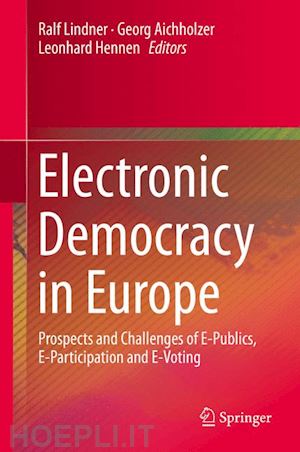
Questo prodotto usufruisce delle SPEDIZIONI GRATIS
selezionando l'opzione Corriere Veloce in fase di ordine.
Pagabile anche con Carta della cultura giovani e del merito, 18App Bonus Cultura e Carta del Docente
This edited book is the first of its kind to systematically address the intersection of e-democracy and European politics. It contributes to an improved understanding of the role that new media technologies play in European politics and the potential impact that Internet-based political participation processes may have on modern-day representative democracy in Europe. A unique, holistic approach is taken to examine e-democracy’s current state and prospects in Europe from three, partially overlapping and interlocking perspectives: e-public, e-participation and e-voting. The authors provide both theory-inspired reflections on e-democracy’s contribution to the formation of the European public sphere, as well as rich empirical analyses of contemporary e-participation phenomena such as the European Citizens’ Initiative or e-voting practices in Estonia. Based on the presented findings, the concluding chapter combines a prospective outlook with recommendations for future paths towards meaningful integration of e-democracy in European politics and governance.
Ralf Lindner is a Professor for Political Science at the Department for Politics & Public Affairs at the Quadriga Hochschule in Berlin and a senior researcher at the Fraunhofer Institute for Systems and Innovation Research (ISI) in Karlsruhe. He received his degree in political science and economics from the University of Augsburg, completed graduate work at the University of British Columbia (Vancouver) and post-graduate studies at Carleton University (Ottawa). His doctoral dissertation focuses on the application and integration of digital networks in the communication strategies of intermediary organisations. In addition to his research in the area of new media and society, Professor Lindner has specialised in science, technology and innovation policy analyses.
Leonhard Hennen studied sociology and political sciences, Dr. Phil. in sociology from Technical University Aachen, Germany. After five years as a social scientist at the departmentof "Technology and Society" at the National Research Centre Jülich (projects on "technology and everyday life", "risk-communication"), he was (1991 to 2005) project manager at the Office of Technology Assessment at the German Parliament, which is run by the Institute of Technology Assessment, Research Centre Karlsruhe. He has been responsible for TA projects on Genetic Testing, Pre-implantation Diagnostics, and Brain Sciences as well as for projects on public acceptance of technologies and technology controversies, Sustainable Development, Research Policy and others. He participated in several European projects on concepts and methods of TA (Europta, TAMI). Since 2006 he has been coordinator of the European Technology Assessment Group (ETAG). Research interests: Sociology of Technology, Technology Policy, Concepts and Methods of Technology Assessment, TA in the field of Biomedicine.
Georg Aichholzer is project director and senior researcher at the Institute of Technology Assessment (ITA) of the Austrian Academy of Sciences (since 1993), and senior lecturer at Vienna University of Economics and Business (since 1992). He holds a PhD in Sociology (University of Vienna) and has extensive research and teaching experience in technology assessment and impact assessment, with a special focus on interrelations of information and communication technologies and society, as well as related policies. Recent fields of interest are electronic governance and electronic democracy, particularly in the area of climate policies.











Il sito utilizza cookie ed altri strumenti di tracciamento che raccolgono informazioni dal dispositivo dell’utente. Oltre ai cookie tecnici ed analitici aggregati, strettamente necessari per il funzionamento di questo sito web, previo consenso dell’utente possono essere installati cookie di profilazione e marketing e cookie dei social media. Cliccando su “Accetto tutti i cookie” saranno attivate tutte le categorie di cookie. Per accettare solo deterninate categorie di cookie, cliccare invece su “Impostazioni cookie”. Chiudendo il banner o continuando a navigare saranno installati solo cookie tecnici. Per maggiori dettagli, consultare la Cookie Policy.